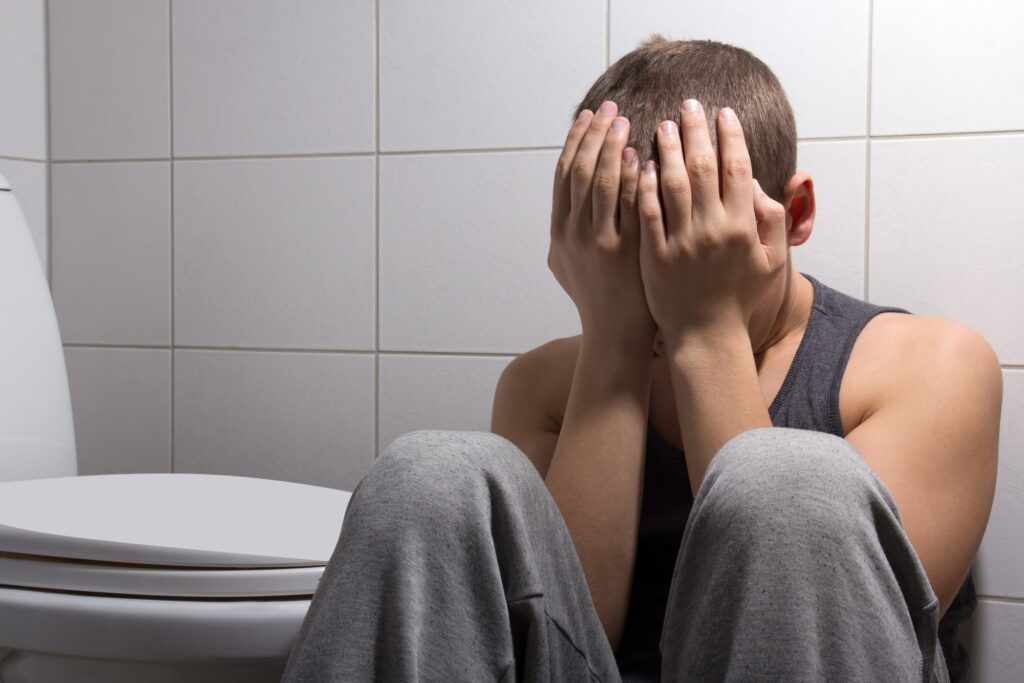Sometimes, an addiction relapse happens immediately after the patient completes the recovery process. Other relapses happen months or even years after the patient leaves their treatment program. In any case, relapses are particularly frustrating when addiction recovery seemed so close. The patient might decline to enter treatment again — if they can relapse again, what’s the point?
However, a relapse isn’t a sign of weakness. Everyone with a substance use disorder is at risk for a relapse. But it doesn’t matter how many times a relapse occurs — everyone has another chance at recovery.

What Is Relapse?
Relapse is a return to old behaviors after a patient started or completed an addiction recovery program. For example, if the patient suffered from an alcohol addiction, they might start drinking again a few months after they leave the clinic. A relapse can happen anytime, no matter how long the patient has maintained their sobriety.
Contrary to popular belief, relapses aren’t always dramatic events. Some patients simply start thinking that they can handle a drink or two or casually take a pill while they’re partying with friends. Unfortunately, a relapse almost always leads to full-blown addiction that takes over their life again.
Fortunately, patients can re-enter addiction treatment without punishment or judgment. Clinics like Behavioral Health Centers treat addiction every step of the way, from initial relapse to aftercare resources.
Types of Relapse
Many addicts don’t jump right into substance abuse after completing their drug addiction treatment. Instead, they start to slowly decline as their health or environmental conditions worsen. Their relapse happens in stages that the patient can reverse if they seek treatment in time. Otherwise, they start thinking they can’t cope with everyday life, which leads to a physical relapse.
Emotional Relapse
An emotional relapse happens before the patient starts thinking about using drugs or alcohol again. In the early stages, patients stop taking care of themselves. They might stop seeing a mental health professional, lose their healthy coping skills or abandon eating well and setting boundaries.
When this happens, the patient has trouble coping with negative emotions. Poor self-care makes their physical condition deteriorate, increasing their risk of future relapses. Not setting healthy boundaries makes people take advantage of them. As their condition worsens, they start thinking about their drug addiction again.
Mental Relapse
If the patient doesn’t seek help in time, they start to seriously consider a relapse. Their drug cravings may increase. Sometimes they attempt coping strategies, but a relapse starts to feel like the only option. In their minds, nothing but drugs or alcohol will help them cope.
To make matters worse, environmental conditions might trigger their drug or alcohol dependence. For example, if relatives don’t support their sobriety, they start thinking they can handle a substance or two. Stress from their job or personal life increases their mental health issues.
Physical Relapse
In the final stage, the patient finally relapses. They might seek out the people who provided the drugs or take a few drinks at a bar. If they don’t spiral right away, the patient starts thinking they have control over their drug and alcohol addiction. This leads them further into their drug abuse. Initially, they may hide the relapse from their family members, but the negative consequences inevitably expose their relapse.
Eventually, the patient loses all control and returns to their addiction. They could lose their job, alienate family members, lose friends and waste thousands of dollars on their addictive behaviors. Their mental health conditions worsen, causing them to increase their drug use. Ultimately, the patient ends up in the same place they were before they sought treatment from a local or national institute.
Why Relapse Isn’t a Sign of Failure
After a relapse, many patients feel guilt. Society judges people with substance use disorders as lazy and selfish instead of people suffering from chronic diseases. Their friends and relatives may look down on them. Since the media glorifies early recovery stories where the addicts never relapse, patients have negative feelings about themselves. If other people can maintain sobriety, why can’t they?
Despite the success stories on TV shows, relapse rates are incredibly high. This doesn’t mean relapse is inevitable, but addictive behavior doesn’t magically disappear during continued recovery. The patient still experiences the same cravings, triggers and thought patterns. Many patients need multiple drug rehab visits before they finally have the tools to prevent future relapses.
People in stressful situations have a particularly high risk for relapse. Generally, relapse prevention means teaching patients how to manage stress and leave toxic environments. However, some patients can’t just walk away. If they’re raising a child, dealing with legal issues or don’t have the money to pack up and leave, their relapse prevention plan might not feel like enough.
Likewise, underlying mental health issues make it harder for patients to recover. Group and individual therapy aim to help patients face their issues and develop coping skills. However, like addiction issues, mental health problems don’t just go away. If a patient finds it nearly impossible to feel positive emotions, they could return to chronic alcohol abuse.
Finally, withdrawal symptoms drive many patients to relapse before they start their treatment programs. Even if they complete a program, symptoms can continue for days, weeks or months. Some health issues never go away completely. The withdrawal symptoms and cravings can be so intense that patients feel like they can’t live without the substance.
Overall, a relapse isn’t a sign of weakness. Instead, a relapse shows that the patient simply needs further addiction treatment before they can move on with their life.

Reach Out for the Help You Need
The first step is admitting the relapse happened. When some people relapse, they tell themselves that it’s temporary or they don’t need help. Patients need to admit that they’ve turned back to their addiction before they’re ready to seek treatment. Once they’ve done that, they can talk to treatment providers about their situation.
Behavioral Health Centers treats addictions to alcohol, heroin, meth, opioids, cocaine, fentanyl and prescription drugs. Generally, patients enter a 28-35 day treatment program that starts with a detox. After taking classes, undergoing therapy and building a healthier lifestyle, patients leave the program with knowledge and aftercare resources.
In addition to the addiction itself, Behavioral Health Centers treats underlying causes like anxiety, depression, bipolar disorder, post-traumatic stress disorder (PTSD), borderline personality disorder (BPD) and obsessive-compulsive disorder (OCD). Once they understand why they turned to substance abuse in the first place, patients reduce the risk of a relapse.
Overcoming Relapse and Getting Back on Track
Typically, patients start the program with a detox that allows substances to leave their body. Since individuals may experience severe cravings and withdrawals during detox, medical professionals observe their treatment to make it as comfortable as possible. They also watch for serious health conditions that could lead to complications.
Once they’ve detoxed, patients start an inpatient program at Behavioral Health Centers’ state-of-the-art facility, which offers 24-hour surveillance and support from their peers. Patients work with professionals to develop a custom treatment plan that may include the following:
- Group therapy with fellow patients
- Individual therapy with a counselor
- Family and marriage therapy
- Medication management to help patients take medicine without compromising their sobriety
- Fitness programs and nutritional therapy for healthy eating
- Neurobehavioral therapy
- Cognitive behavioral therapy (CBT)
- Eye movement desensitization and reprocessing (EMDR)
- Dialectical behavioral therapy (DBT)
- Art and music therapy
- Alternative treatments like mindfulness, yoga and meditation
These services aim to tackle every aspect of the patient’s life so they can improve their relationships, enjoy better health, leave toxic environments, accept the past and challenge their thought patterns. With these tools, they can start rebuilding their life instead of falling back into old habits, decreasing the chance that they’ll relapse again.
Behavioral Health Centers Is Here to Help
We offer extensive treatment for patients dealing with a drug or alcohol addiction. Typically, the addiction recovery process starts with a medically supervised detox that allows the drugs or alcohol to leave your system. Afterward, we develop a substance abuse treatment plan that may include support groups, fitness programs and family therapy sessions.
Reach out to Behavioral Health Centers to learn more about our treatment program that provides a support system and aids you in relapse prevention. Our behavioral therapies tackle the root of the issue to encourage long-term sobriety.







